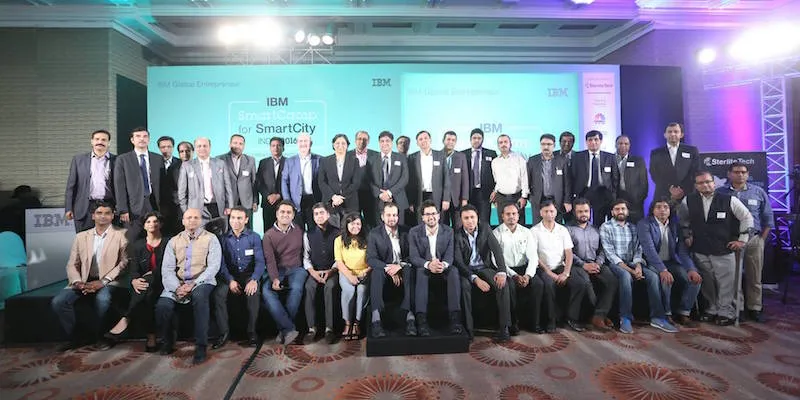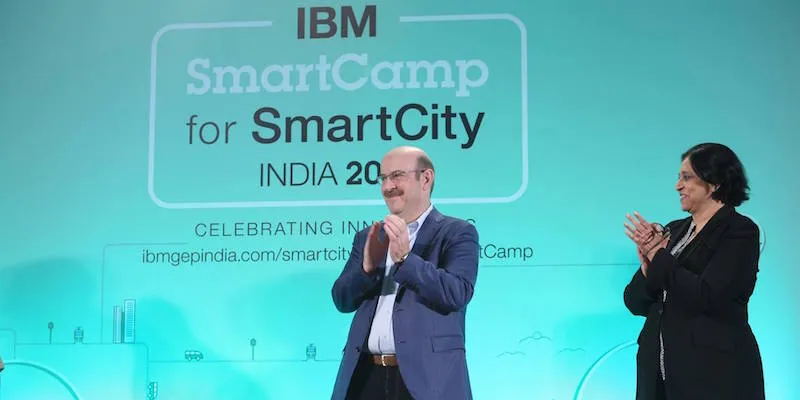These 10 startups showed how their innovations are helping build a better future, at IBM’s Smartcamp for Smart Cities
This story is sponsored by IBM
The recently-held IBM Smartcamp for Smart Cities organised by the IBM Global Entrepreneur program in association with Sterlite Technologies saw participation from startups with solutions in the space of Energy & Utility, Transportation, Sanitation, Water, Citizen Management, Safety and Surveillance. Of the 115 applicants, these 10 startups went on to the final round:
Zippr Private Limited
Address discovery and its efficient implementation is key, especially in a market like India. Zippr fundamentally transforms how locations are referenced, shared and found by replacing the traditional door number with an innovative 8-character digital address format.
The Indian government is implementing the startup’s patent-pending road-based encoding technology across the country through a closed-loop ecosystem.
Zippr licenses its data and map APIs to businesses. Zippr's digital door numbering solution works with address authorities such as municipal corporations and urban development bodies to replace the traditional door number with a Zippr code. The startup uses both mobile technology (Android, iOS), search platform (elastic search), open-source tech stack (MEAN) and other advanced data science techniques.
We Do Sky
From helping map smart cities, to predicting solar power potential, or transforming how mining is done in the country, this seven-member startup helps organisations untangle challenges on the ground through unmanned aeriel systems, geographic information systems, and computer vision
We Do Sky uses drones for aerial shoots, processes the data collected and extracts intelligent inputs to provide solutions for major problems across sectors such as agriculture, mining, utilities and infrastructure and urban planning, significantly bringing down the time and cost. Their software is designed from the grounds up for the Indian terrain.
Their clients include the Indian Government, corporates, research and educational institutes, and start-ups.
Get My Parking
The problem of inefficient parking impacts several aspects of urban development leading to congestion, increased carbon emissions and loss of productivity.
This startup is working to transform this space by creating a complete smart parking ecosystem. Using the app, the driver gets real-time visibility and information about parking at his destination including the time needed to park the car at the indicated spot. He has the option of choosing value-added services like a car wash, or a snack. While leaving, he directly exits the parking having already paid via m-wallet. Globally, the smart parking space has seen an investment of $300 million in recent years, but existing solutions are not flexible enough to succeed in emerging markets.
The differentiator for Get My Parking is that their frugal innovation allows them to digitise any unorganised parking at a fraction of the cost of other alternatives and aggregate the supply side (contractors and government). This gives them a virtual monopoly of parking data in India.
Oizom Instruments Pvt. Ltd.
Ever-increasing industrialisation have increased the challenges relating to pollution monitoring. The heavy energy consumption and operational costs of existing pollution monitoring systems does not make them sustainable in the long run. Oizom’s solution "Polludrone" is a solar powered IoT air-quality monitor which is also low-cost, compact and eco-friendly.
It works on patent pending technology and measures particulates, toxicity, odour, radiation, light, noise and other parameters on a real-time basis. The findings are made available through a cloud analytics platform and mobile app. Polludrone is capable of measuring all the parameters included as compliance by the Central Pollution Control Board.
Flamencotech (I) Pvt. Ltd.
This startup provides Intelligent Digital Infrastructure Solutions through consultative solutions and a co-creation approach, enabling its customers to solve business pain points. In the context of Smart Cities, the startup’s solution acts as an overlay to all technologies making it the command and control centre application for Smart Cities, through aggregation of various alarms and notifications, which are intelligently analysed and action is taken accordingly.
The company works on various technologies under the IOT umbrella and has developed a proprietary IOT Platform called Digital Blanket .

TartanSense
The world's population is set to rise to 9 billion by 2050 and with arable lands decreasing, increased agricultural yield is a key need. TartanSense aims to bring actionable intelligence to the agricultural sector using precision data and machine learning through UAVs.
TartanSense's focus is only on agriculture, which sets them apart from other UAV startups. They have already processed ~40,000 acres through their cloud, and their algorithms have continuously become better with more data. Since UAVs are banned in India, this is one of the few startups to have a 100 per cent international client base
LoudCell Technologies Pvt Ltd
LoudCell develops technology for IoT based sensors, remote hardware, and cloud based middle-ware which help customers eliminate energy wastage, manage their energy generation and consumption, providing insights in the form of a single dashboard, analytics and intelligent alerts.
Their focus is to provide end-to-end solutions – from sensors to hardware to software and comprehensive on-premises energy insights including generation from diesel generators, grid and solar, and consumption. They even have accurate and reliable sensors for fuel measurement. On the cloud side, they have a gateway which can be easily scaled to millions of devices and support multiple protocols.
Esyasoft Technologies Private Limited
The conventional electric grid is plagued by demand-supply mismatch, huge revenue losses and infrastructure challenges with high maintenance costs.
While smart grids offer a respite, existing solutions in this space consist of standalone applications that address only a small part of the problem. This startup is working on a robust, integrated and scalable smart grid solution that manages the entire data and workflow and converts it into actionable business insights.
Esyasoft’s solution uses business intelligence and analytics, as well as information and communication technologies to integrate the entire power value chain, including multiple stakeholders such as power utilities, consumers and regulators.
quenext
The true worth of smart networks in the energy sector can truly be realised only if they also offer collective intelligence, which is not readily available in India today. This startup adds intelligence to smart networks, by integrating data from a multitude of sources across distribution, transmission, metering systems and telemetry channels. Apart from these, the system is fully integrated with all weather stations across India and can also integrate with remote sensing satellite imagery. The system generates both real time and near term forecast of load and availability across energy mixes, which helps utilities bring down losses, reduce loads and optimise their capacity. The startup’s platform works on a use case basis, making it easier to use and more efficient unlike generic platforms which exist in the market today
FlyBird Farm Innovations Pvt Ltd
Small and marginal farmers typically cannot afford irrigation controllers and have to manually control water flow which can be inaccurate and inconsistent, leading to over or under irrigation.
With the water table also going down day by day, and erratic agricultural power supply in India, farmers need precise and effective utilisation of natural and available resources
FlyBird Farm Innovations has developed an affordable and innovative smart/precise irrigation controller for poor farmers. By using scientific methods, soil moisture/temperature/humidity sensors, the solution prevents under/over irrigation and helps improve crop production and saves water, energy and time for farmers.
IBM Smartcamp for Smart Cities
From 115 applications, 30 were shortlisted. The IBM team conducted interviews and went through demos following which 10 were finalised.
A panel consisting of IBM executives VCs including Padmaja Ruparel, Founder and President of Indian Angel Network; Sanjay Mehta, Angel Investor; Sateesh Andra, Endya Ventures; Anil Joshi, Founder, Unicorn Ventures; Madhukar Srivastava, Chief Delivery Officer, Sterlite Technologies; Seema Kumar, Country Leader, Developer and Startups, IBM India and SA; Shailesh Vikram Singh, Executive Director, Seed Fund; Girish Gupta, CEO, Rajasthan Venture Capital Fund; Karan Bajwa, IBM Executive Staff and Digvijay Singh, COO, Indian Angel Network.

Every finalist had 30 minutes to present to the panel and take them through a demo.
In the evening, the teams presented to a panel of 20 CIOs, in the presence of an audience of over 250 people with guests of honour Vanitha Narayanan, MD, IBM India Pvt Ltd and John Gallagher, IBM Global Head of Programatic and Performance Marketing. The winners were decided after scores from the VCs panel and the CIO panel were collated.
The top three spots went to Zippr, which was declared the winner, followed by Tartansense in the second place and Get My Parking in the third.
This year’s IBM Global Entrepreneur program’s Startup Challenge focused on four sectors – Fintech, Healthtech, Smart City and Deep Tech.
For more details, please visit ibmgepindia.com.







